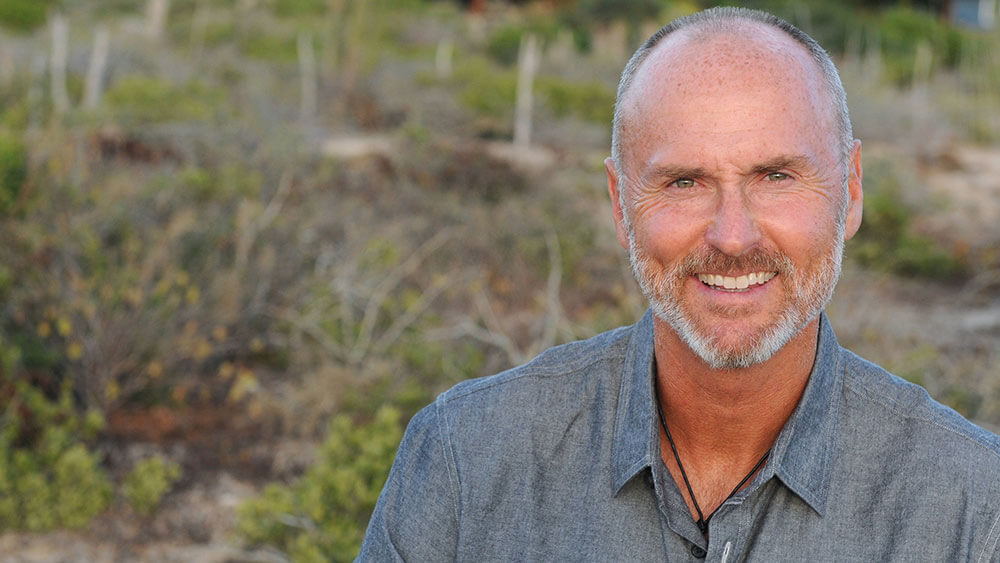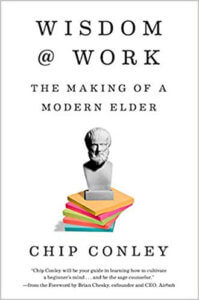
When Chip Conley was in his early 50s, after selling boutique hotel company Joie de Vivre, he began working at Airbnb as a strategic adviser with far younger colleagues. (Lisa Keating)
In his book Wisdom@Work: The Making of a Modern Elder, hospitality entrepreneur Chip Conley cites a 2016 Harvard Business Review study, “How Age and Gender Affect Self- Improvement,” that refutes the stereotype that older generations are set in their ways, resistant to change, and resentful of their younger colleagues. “They found that older people were more open to self-improvement and less defensive to criticism,” Conley writes, “because they had evolved over time to focus on improving instead of just proving themselves. In sum, our evolution doesn’t end at midlife. It may accelerate.”
Conley would know. In his early 50s, after selling boutique hotel company Joie de Vivre, Conley was recruited to join the Airbnb team as a strategic adviser. Having never worked at a tech company before, and now surrounded by far younger colleagues, Conley adapted by becoming what he calls a “Modern Elder.”
 He uses the term to describe an older professional (relative to his/her field) who exercises good judgment, provides unvarnished insight, understands the value of emotional intelligence, practices holistic thinking, and takes pride in their stewardship, according to Wisdom@Work. But as Conley notes in his book, society does not function in a way that supports the growth of Modern Elders. Conley told Convene via email that while there’s ample evidence that age-diverse — similar to race-diverse and gender-diverse — teams are more effective, only a small fraction of organizations include age in their diversity and inclusivity programs. Given that the fastest-growing age demographic of employees in the workplace is 65 and older, that’s a major oversight.
He uses the term to describe an older professional (relative to his/her field) who exercises good judgment, provides unvarnished insight, understands the value of emotional intelligence, practices holistic thinking, and takes pride in their stewardship, according to Wisdom@Work. But as Conley notes in his book, society does not function in a way that supports the growth of Modern Elders. Conley told Convene via email that while there’s ample evidence that age-diverse — similar to race-diverse and gender-diverse — teams are more effective, only a small fraction of organizations include age in their diversity and inclusivity programs. Given that the fastest-growing age demographic of employees in the workplace is 65 and older, that’s a major oversight.
“Society has done a great job of helping people through stages of life that are often known for transitions: puberty, commencement of adulthood, marriage, etc.,” Conley told Convene. “We haven’t similarly ritualized midlife or career transitions, but that doesn’t mean we can’t start creating a celebration of when a midlifer changes their career or we take a gap year (or any substantial period) to reflect on what we want next in our life.”
Conley created four stages — Evolve, Learn, Collaborate, and Counsel — through which individuals can learn to become Modern Elders on their own, and spread the word to their peers going
Related: Ending the ‘Last Acceptable Prejudice’
through similar life changes. He said the stages are particularly relevant to the events industry. “Given how many generations, dialects, and diverse people meeting planners need to serve, the key is to be careful of stereotypes and judgment and be open to learning about new people and their interests,” Conley said. “Using these stages and the tips associated with each is one way to guide people to become more curious and wiser — which are the two key qualities of a Modern Elder.” They are:
Evolve
A key part of evolving one’s image later in life is taking stock of one’s “personal brand” or reputation. Is it an accurate depiction of who you are as a Modern Elder, or does it need to be changed? “Most of us who’ve been in the workplace a long time know that our reputation is portable; it arrives before you show up due to the cosmic bellhop who delivers it,” Conley said. Conley’s top suggestion for Modern Elders looking to assess their reputation is to identify five adjectives they’d want to be described as, and then ask a dozen colleagues what adjectives they’d use to describe you — anonymously, if possible — and see how much alignment there is between the ideal and reality.
Learn
Everyone knows that asking questions is an important way to learn. But more importantly, it’s about asking the right questions. “At 52, I joined a tech company for the first time so I was clueless about the lingo and logic, but I rarely held up a meeting by asking for translations. I asked those questions later of people I trusted,” he said. Instead, he learned the art of asking catalytic questions — “questions to help illuminate blind spots and opportunities. Because one positive quality of being an outsider is you have fresh eyes and possibly see things that others, who’ve been there longer, don’t see,” Conley said.
Collaborate
In Wisdom@Work, Conley places heavy emphasis on the “EQ for DQ” exchange between younger and older generations — emotional intelligence for digital intelligence. “The No. 1 thing [organizations] can do is to encourage more ‘mutual mentorship’ across generations,” Conley told Convene.
Counsel
How Modern Elders provide emotional intelligence to younger colleagues may turn into more distinct counseling roles, from lending an ear regarding a specific work issue to serving as a loyal confidant. This represents an opportunity for organizations to formalize those intergenerational connections. “Companies are creating new matching technology,” Conley said, “to encourage, in some cases, their five generations of workers to learn from each other through mentorship matches.”
Casey Gale is a Convene associate editor.
Test Time
- Earn one clock hour of certification credit.
- Once you’ve finished reading the June Convene age discrimination stories, read an Experient blog post, “Why the Over-50 Crowd Still Matters for Events,” by Donna Kastner.
- To earn certification clock hours, visit Convene’s CMP Series page to answer questions about information contained in this CMP Series article and the additional material.
The Certified Meeting Professional (CMP) is a registered trademark of the Events Industry Council.
